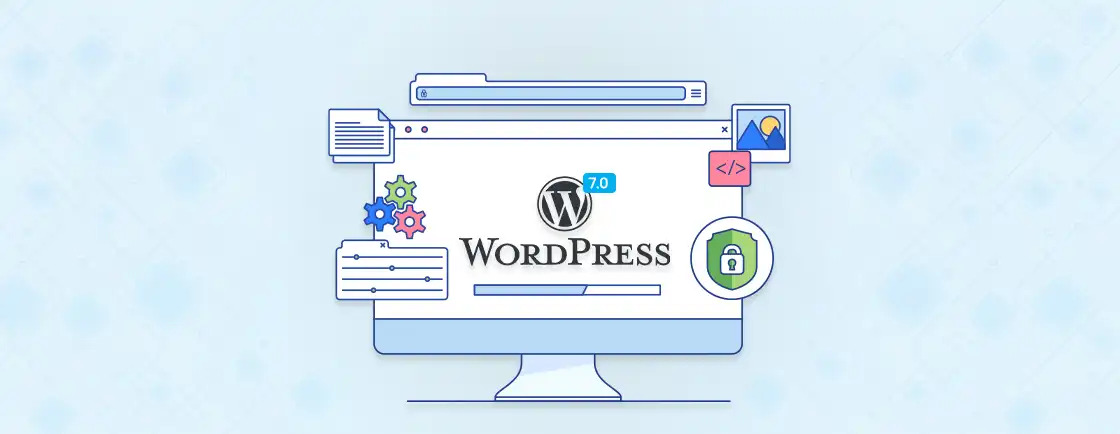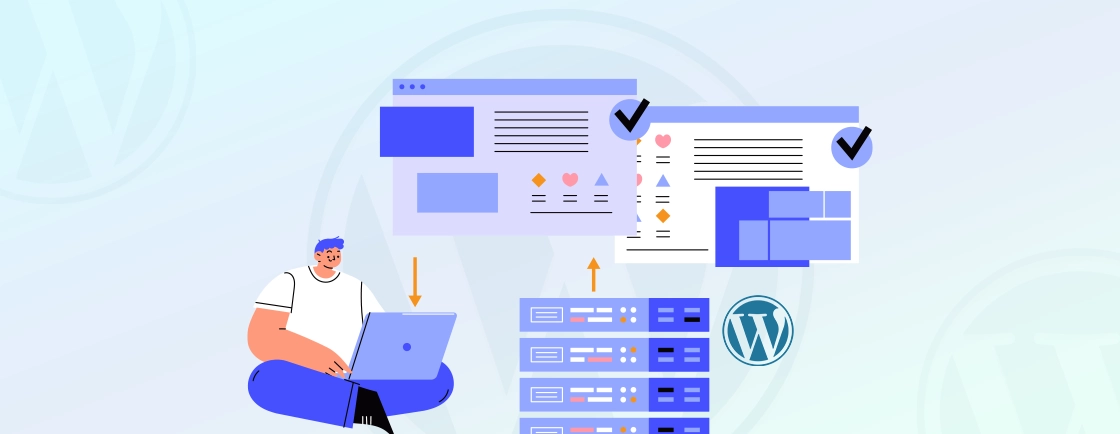Table of Contents
Trying to create a new high-quality website? Then, a CMS can make a world of difference. Although there is an array of options available, WordPress stands out as a true champion, empowering users of all levels to create stunning and effective online presences.
Initially created as a simple blogging platform, WordPress has evolved into one of the most popular and powerful CMS solutions, widely used across the internet. But what makes it so successful?
Why is WordPress regarded as the best CMS? Why are WordPress development services so popular? There are different reasons behind that, and I’ll try to explain each in detail. But first, let’s see what CMS and WordPress are.
What is a CMS?
A CMS, or Content Management System, is a software application that allows users to easily create, manage, and modify digital content. It provides a user-friendly interface for non-technical individuals to handle website content without the need for coding knowledge.
CMS platforms streamline the process of content creation and publication by offering templates, plugins, and themes, making website management efficient and accessible.
Some popular CMSs include WordPress, Drupal, and Joomla. WordPress is the most popular CMS in the world, powering a majority of websites. Drupal and Joomla are also good options for small to medium-sized businesses, but still, WordPress is considered the best CMS.
What is WordPress?
WordPress is a popular content management system (CMS) that allows users to easily create and manage websites without any coding knowledge. It offers a wide range of features and customization options, making it a top choice for website creation. With WordPress, you can easily change the appearance of your website using themes and add new features through plugins. Its user-friendly interface makes it simple to update and manage your website’s content.
One of the major benefits of using WordPress is its large and active community. This means that there are plenty of resources available, including tutorials, forums, and plugins, to help you make the most out of your website. Additionally, WordPress is regularly updated and improved, ensuring that your website remains secure and up-to-date.
What are the Advantages of Using WordPress as a CMS?
WordPress is a popular content management system (CMS) that has many advantages over other CMSs. Here are some of the key benefits of using WordPress:
- Easy-to-Use Interface: WordPress offers a user-friendly interface that is simple and intuitive, making it accessible for users of all technical levels to manage and update their websites.
- Open-source and Cost-effective: As an open-source software, WordPress is free to use and does not require any licensing fees. Additionally, the availability of free themes and plugins reduces the cost of website development and website maintenance.
- Wide Range of Themes and Plugins: There are thousands of WordPress themes and plugins available, which means that you can easily customize your website to look and function however you want. You can install WordPress themes to control the overall design and appearance of your website, while installing plugins can help add new features and functionality.
- SEO-friendly: WordPress is designed with search engine optimization in mind, making it easier to optimize websites for better visibility and ranking. It offers features like customizable permalinks, meta tags, and integration with popular SEO plugins.
- Secure and Reliable: WordPress is a secure and reliable platform that is constantly being updated to protect against the latest security threats. This helps keep your website safe and secure.
- Strong Community Support: With a large and active community of developers and users, WordPress provides extensive support resources such as forums, tutorials, and plugins, ensuring that users can easily find help and solutions for any issues they may encounter.
- Scalable for Growth: WordPress can be scaled to accommodate websites of all sizes, from small blogs to large enterprise websites. This means that you can start with a small website and grow it as your business or needs change.
- Versatility and Customization Options: WordPress offers a wide range of themes and plugins, allowing users to customize their websites to meet their specific needs and preferences. This flexibility makes it suitable for various types of websites, from personal blogs to e-commerce stores.
- Regularly Updated: WordPress is regularly updated with new features and security patches, which helps keep your website up-to-date and secure.
- Ability to Add Custom Code: WordPress developers can add custom code to your WordPress website to further customize its look and functionality.
Overall, WordPress is a powerful and versatile CMS that is easy to use and learn. It is a great option for businesses and individuals of all sizes who want to create a website that is professional, secure, and easy to manage.
Why is WordPress the Best CMS?
With numerous content management systems (CMS) available, it can be overwhelming to choose the right one for your website. However, one CMS consistently stands out among the rest – WordPress. But why? Let’s find out.
User-Friendly Interface
A user-friendly interface is one of the main reasons why WordPress is widely considered the best CMS. Here are the steps to understand its user-friendliness:
- Easy installation: WordPress offers a simple and straightforward installation process, allowing users to set up a website quickly.
- Intuitive dashboard: The backend dashboard of WordPress is designed to be user-friendly, with a simple and intuitive interface that makes it easy to navigate and manage your website.
- WYSIWYG editor: WordPress includes a What You See Is What You Get (WYSIWYG) editor, enabling users to create and edit content without any coding knowledge.
- Customizable themes and plugins: WordPress offers thousands of themes and plugins that allow users to customize their website’s appearance and features without technical skills. Users seeking more control can even learn how to create a WordPress plugin to build custom functionality tailored to their specific needs.
- Drag-and-drop functionality: Many WordPress themes and plugins provide a drag-and-drop interface, making it easy for users to arrange and customize elements on their website.
By providing these user-friendly features, WordPress ensures that users can easily navigate and manage their website, even without prior technical knowledge or experience.
Vast Community Support
The extensive community support is one of the main benefits of using WordPress as a content management system (CMS). The WordPress community is made up of millions of developers, designers, and users who actively contribute to the platform’s development and offer support to one another. Here are the steps to take advantage of this vast community support:
- Join the WordPress forums and communities to connect with other users and experts in the field.
- Participate in local WordPress meetups and conferences to network and learn from experienced professionals.
- Utilize online resources such as blogs, tutorials, and documentation provided by the WordPress community.
- Engage with the WordPress community on social media platforms to stay updated with the latest trends, updates, and best practices.
- Contribute to the community by sharing your knowledge, answering questions, and providing valuable feedback.
By utilizing the extensive community support, you can find solutions to technical issues, gain insights, receive guidance, and stay connected with a vibrant community of WordPress enthusiasts.
Flexibility and Customization Options
Flexibility and customization options are essential components that contribute to WordPress’s popularity as a CMS. With its vast selection of themes, plugins, and customization features, WordPress empowers users to build unique and personalized websites tailored to their specific needs. Here are some steps to take advantage of this flexibility:
- Select a theme: Choose from a diverse library of themes that cater to various industries and design preferences.
- Customize the appearance: Utilize the WordPress Customizer to modify colors, fonts, and layouts to align with your brand’s identity.
- Add functionality: Explore the wide range of plugins available to enhance your website’s features and capabilities, such as contact forms, eCommerce options, and social media integration.
- Create custom content: Take advantage of the block editor or page builders to effortlessly design and structure your website’s pages and layout.
- Add custom code: For advanced users, WordPress offers the option to add custom HTML, CSS, and PHP code to further personalize the website.
By following these steps, users can fully utilize the flexibility and customization options provided by WordPress to create a website that perfectly aligns with their vision and objectives.
SEO-friendly
WordPress is designed to be search engine friendly, which means that your website is more likely to rank well in search engine results pages (SERPs). This can help you drive more traffic to your website and increase your online visibility.
- SEO Plugins: WordPress offers a wide range of SEO plugins, such as Yoast SEO and All in One SEO Pack, to help optimize your website’s content, meta tags, XML sitemaps, and more.
- Clean Code: With its clean and semantic code, WordPress makes it easier for search engines to crawl and index your website, enhancing its visibility in search engine results.
- Mobile Optimization: WordPress themes are designed to be mobile-friendly, ensuring your website performs well on different devices. This is crucial for SEO as search engines prioritize mobile-friendly websites.
- Speed Optimization: Through caching plugins, image optimization, and minification, WordPress allows you to optimize your website’s speed. Fast-loading websites have a higher chance of ranking well in search results.
- Permalink Structure: Customizing your permalink structure with WordPress makes it easier for search engines and users to understand your website’s URLs.
Along with optimizing your website for search engines, focus on creating high-quality and relevant content that adds value to your audience. Regularly updating your website with fresh content can also improve your SEO rankings.
Cost-Effective
WordPress is widely known for being a cost-effective CMS thanks to its affordability and various cost-saving features. Here are some steps to highlight its cost-effectiveness:
- Free to Use: WordPress itself is an open-source software available for free, meaning you don’t have to pay any licensing fees.
- No Development Costs: With a wide range of pre-designed themes and plugins, you can easily create and customize your website without the need for extensive coding or expensive developers.
- Low Maintenance Costs: WordPress regularly releases updates to enhance security and functionality, ensuring your website remains secure and up-to-date. These updates are free, reducing the need for additional maintenance costs.
- Affordable Hosting: WordPress is compatible with various hosting providers that offer affordable hosting plans suited to different budgets and needs.
- Reduced Marketing Expenses: WordPress is SEO-friendly, improving visibility in search engine rankings, which can lower the need for expensive marketing campaigns.
By utilizing these cost-saving features, WordPress provides a cost-effective solution for individuals and businesses looking to create and manage their websites. This makes WordPress pricing highly attractive compared to other CMS platforms.
What are the Alternatives to WordPress as a CMS?
While WordPress remains one of the most popular content management systems (CMS) in the world, it may not be the best fit for every website. However, there are several prominent CMS options that could be excellent for your website project.
Drupal
Drupal is a powerful and flexible CMS often used for enterprise websites. It is known for its scalability, security, and a large community of users and developers. However, Drupal has a steeper learning curve than WordPress and requires more technical knowledge to use.
Joomla
Joomla is a popular CMS that is similar to WordPress in terms of its features and functionality. It is a good option for small to medium-sized businesses. Joomla is also relatively easy to use, but it has a smaller community of users and developers than WordPress.
Squarespace
Squarespace is a website builder that is known for its beautiful design templates and drag-and-drop interface. It is a good option for businesses and individuals who want to create a professional-looking website without having to learn how to code. However, Squarespace is not as flexible as WordPress and Drupal, and it does not have as many third-party plugins and themes available.
Wix
Wix is another popular website builder that is similar to Squarespace. It is a good option for businesses and individuals who want to create a simple website quickly and easily. Wix is even easier to use than Squarespace, but it is also less flexible and has fewer features.
Magento
Magento is a powerful eCommerce CMS that is used by some of the world’s largest online retailers. It is known for its scalability, flexibility, and wide range of e-commerce features. However, Magento is a complex platform that requires a lot of technical knowledge to use.
| Platform | Usage | Market Share |
|---|---|---|
| Drupal | Complex sites, government, education | 1.5% |
| Joomla | E-commerce, social networks | 2.2% |
| Squarespace | Small businesses, personal sites, bloggers | 2.7% |
| Wix | Small businesses, designers, artists | 2.3% |
| Magento | Large, complex online stores | 0.8% |
The best CMS for you will depend on your specific needs and requirements. If you are looking for a powerful and flexible CMS, then Drupal or Magento may be a good option for you. If you are looking for an easy-to-use CMS with a drag-and-drop interface, then Squarespace or Wix may be a better choice. However, if you want the perfect balance of scalability and ease of use, our WordPress development agency can help you customize WordPress to outperform any alternative. And if you are looking for a platform specifically designed for e-commerce, then Magento, or a custom WooCommerce setup managed by our team—is the best choice.
To Conclude
Whether you’re crafting a personal blog, launching an eCommerce store, or building a sophisticated business website, WordPress seamlessly adapts to your needs. Its extensive ecosystem of plugins and themes empowers you to create a website that truly reflects your vision and brand without the constraints of technical expertise.
Here’s what makes WordPress the best CMS:
- User-Friendly Interface
- Vast Community Support
- Flexibility and Customization Options
- SEO-friendly
- Cost-Effective
So, if you want to use WordPress for your web development projects, have a consultation with us today! Whether you need a simple blog or a complex enterprise solution, you can hire dedicated WordPress developers from our team to ensure your site is built with the highest standards of performance and security.
FAQs on Why WordPress is the Best CMS
What features does WordPress offer?
WordPress offers a wide range of features, including customizable themes, plugins for added functionality, built-in SEO optimization, user management, and e-commerce capabilities. It also has a mobile-friendly design and is constantly updating to meet the demands of modern websites.
Is WordPress suitable for beginners?
Yes, WordPress is suitable for beginners. Its simple and intuitive interface makes it easy for anyone to create and manage a website without any technical knowledge. There are also plenty of tutorials and resources available to help beginners get started.
Is WordPress secure?
With regular updates and security patches, WordPress is considered a secure platform. However, it is important to regularly update themes and plugins and use strong passwords to ensure the utmost security for your website.
Create with WordPress CMS
Build flexible and scalable websites using WordPress's powerful content management system.





